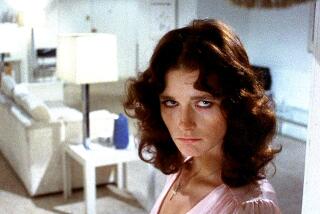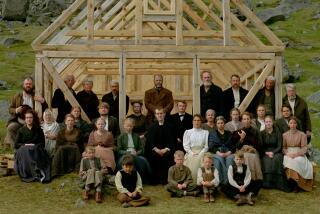More finger-wagging from Von Trier
- Share via
In 2003’s “Dogville,” the first installment in Danish filmmaker Lars von Trier’s United States trilogy, the town philosopher Tom Edison tries to explain his penchant for inflicting long public lectures on his fellow citizens. “I think there’s a lot this country’s forgotten,” he says. “I just try to refresh folks’ memories by way of illustration.” In “Manderlay,” the haughty sequel to “Dogville,” Von Trier once again comes off like Tom with a hand-held camera -- unafraid to preach, and determined to thrust a less than forgiving mirror into the face of America -- but this time he’s forgotten about the power of illustration. Where it took “Dogville” half of its running time to reveal itself as a finger-wagging sermon on the violent lie of small-town American idealism, “Manderlay” is pompously didactic from the first of its 133 long minutes -- a harsh and endlessly schematic morality tale in which diatribe is mistaken for story.
“Manderlay” opens in 1933, with “Dogville’s” Grace -- played this time not by Nicole Kidman but by the porcelain-faced Bryce Dallas Howard -- stumbling on “a God-forsaken place,” an Alabama plantation named Manderlay where slavery is still the law of the land. Like the Rocky Mountain town of Dogville, the Depression-dreary Manderlay that Grace finds is suggested more than it is seen. Von Trier once again shoots on a minimalist soundstage, with chalk-marked lines and stenciled floor descriptions that stand in for actual buildings or locations (the houses have no doors but we can hear characters knock on them).
Grace -- prim, proud and sewn up tight in her fur-collared coat -- is horrified by the idea that slavery still exists in the land of the free and even more horrified when she sees one of Manderlay’s slaves, Timothy (Isaach De Bankole), under the vicious lash of a whip. With the righteous determination of an abolitionist and the arrogant entitlement of society Samaritan, Grace is set up to look ridiculous in her quest to bring freedom to Manderlay. Her misogynist brute of a father (Willem Dafoe) insists it’s a “local matter” not meant for her meddling, but for Grace, whose determination to prove her own freedom from Daddy fuels much of “Manderlay’s” plot, it’s a simple matter of moral obligation. “We owe these people,” she huffs more than once. Grace quickly makes Manderlay her pet project. She turns the former white overseers into manual laborers (forcing them to serve dinner while in blackface) and draws up new contracts so that the plantation runs like a cotton co-op. But gradually, Grace’s tables are turned on her. A dust storm sets back the first harvest. A woman steals food from a dying child, and Grace is forced to play the executioner.
Worst of all, though, she finds out that nobody wants the gifts she’s giving. Grace learns that the plantation’s book of laws, Mam’s Law, wasn’t written by its newly dead mistress (Lauren Bacall) but by Wilhelm (Danny Glover) the docile house Negro who turns out to be less than docile. What Grace sees as “a recipe for oppression,” he sees as protection and safety for the people of Manderlay. So much so that the plantation not only votes to continue living under slave law, but to make Grace the law’s new enforcer. With conspicuous winks to Abu Ghraib and Gitmo, she ends up carrying out the very beatings on Timothy that she once opposed.
Which leads us right back to Von Trier’s favorite territory: One woman’s kindness to a community gets repaid with abuse. In “Dogville,” Grace was fondled, raped, and chained to a metal wheel. In “Manderlay,” Grace is on her back again, though Von Trier tries to convince us that because of her ingrained racist lust for Timothy the African buck, she actually wants it this time. Unleashing scathing critiques of democratic hypocrisy is one thing; unleashing them through the pummeling and mockery of women is another.
“Manderlay’s” methods wouldn’t be such an issue if, as in “Dogville,” the message they were serving was made clear. Von Trier can’t decide if he’s taking an X-ray of the racist heart of white American liberalism or showing how coercive, democratic goodwill can blow up in the nation’s face. He might even think they’re the same thing if the final credits montage is any indication (it jumps from KKK rallies and civil rights marches to a shot of President Bush and a Twin Towers zoom-in, all to the tune of David Bowie’s “Young Americans”). Trier gets lost in his own rhetoric, forgetting to entertain his flock while raking them over the coals.
*
‘Manderlay’
MPAA rating: Unrated
An IFC Films release. Writer-director Lars von Trier. Producer Vibeke Windelov. Cinematographer Anthony Dod Mantle. Editor Molly Malene Stensgaard. Running time: 2 hours, 13 minutes.
Exclusively at the NuArt, 11272 Santa Monica Blvd., West L.A., (310) 281-8223, and University Town Center 6, 4245 Campus Drive, Irvine, (949) 854-8818.
More to Read
Only good movies
Get the Indie Focus newsletter, Mark Olsen's weekly guide to the world of cinema.
You may occasionally receive promotional content from the Los Angeles Times.










